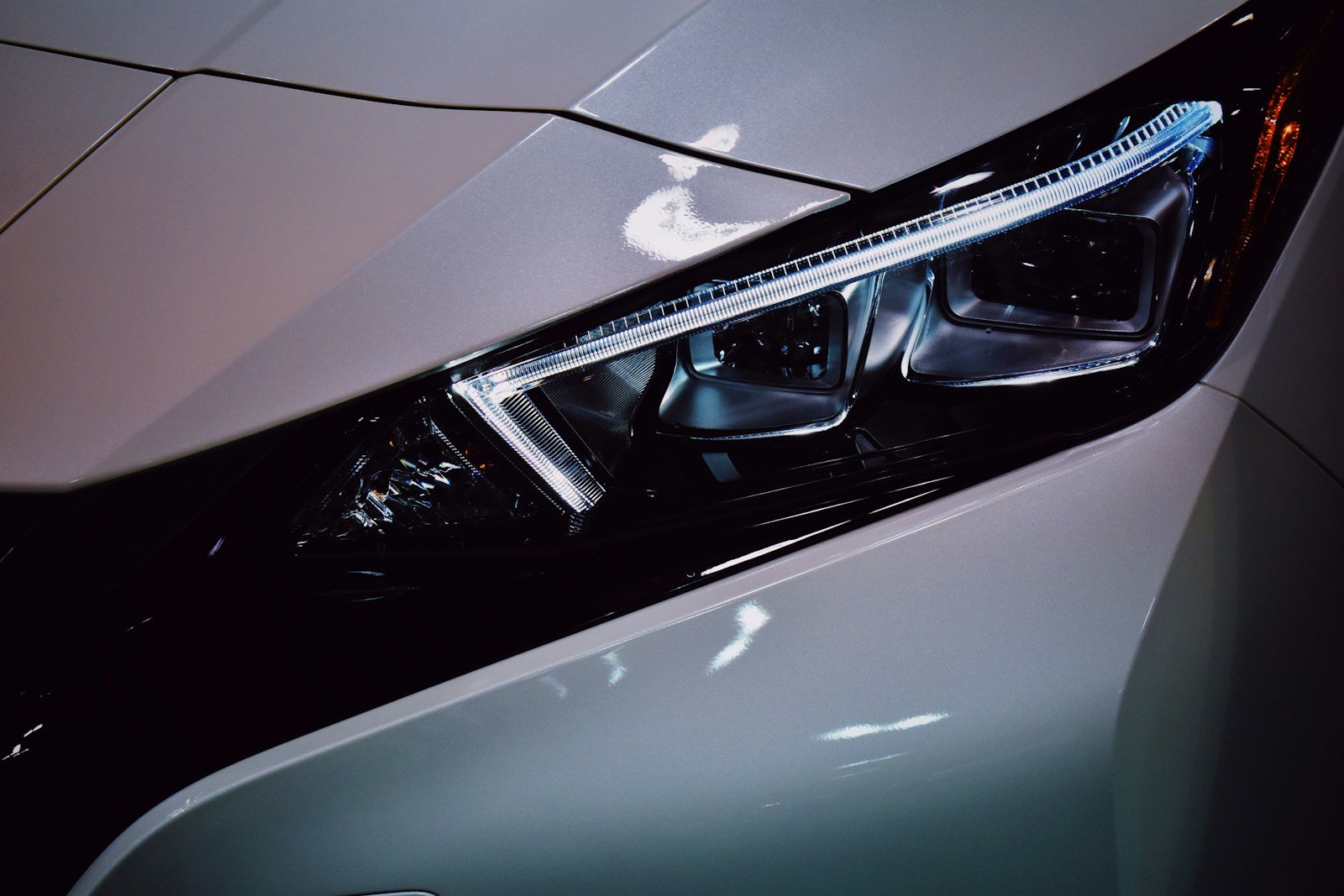Electric vehicles are becoming more accessible as manufacturers release affordable options for budget-conscious consumers. With gas prices fluctuating and environmental concerns growing, many drivers are looking to make the switch to electric cars but worry about the high price tags traditionally associated with them.
The good news is that several affordable electric vehicles now offer impressive range and features while staying under $40,000, making them realistic options for everyday drivers. These budget-friendly EVs come from established manufacturers like Nissan, Chevrolet, and Hyundai, providing reliable transportation with the added benefit of lower operating costs and reduced environmental impact.
1. Nissan Leaf
The Nissan Leaf stands out as one of the most affordable electric vehicles on the market today. As a pioneering EV, it offers budget-conscious buyers an entry point into electric driving without breaking the bank.
The base model 2025 Nissan Leaf comes equipped with a 40-kilowatt-hour battery that powers a 147-horsepower electric motor. This combination provides an EPA-rated range of 149 miles on a full charge, sufficient for daily commuting and errands.
For drivers seeking more range, Nissan offers the upgraded SV Plus version. This model increases the driving range to 212 miles per charge, giving owners more flexibility for longer trips.
One reason for the Leaf’s budget-friendly price point relates to its battery cooling system. Unlike most modern EVs, the Leaf uses a passive cooling system for its battery. This design choice helps keep production costs down but can limit performance during extended highway driving or in hot weather conditions.
Inside the cabin, the Leaf impresses with comfortable seating and surprisingly spacious accommodations. The practical hatchback design maximizes cargo capacity, making it suitable for small families and active lifestyles.
The 2025 model includes modern features that enhance the driving experience. Nissan’s commitment to technology means even the base model comes with essential connectivity options and driver assistance systems.
Charging the Leaf at home is straightforward with a standard household outlet, though a Level 2 charger significantly reduces recharge time. Public charging is also an option, but the Leaf’s charging speed falls behind some competitors in the rapidly evolving EV market.
For urban dwellers and those with predictable daily driving patterns, the Nissan Leaf represents an excellent value proposition. Its combination of affordability, practical design, and zero-emission driving continues to make it a compelling choice in the budget EV segment.
2. Hyundai Kona Electric
The 2025 Hyundai Kona Electric stands out as one of the most affordable electric vehicles on the market today. This small electric SUV combines style, technology, and practicality in a budget-friendly package.
With an EPA estimated range of 261 miles, the Kona Electric offers impressive distance coverage between charges. This makes it suitable for daily commuting and weekend trips without frequent charging stops.
The vehicle underwent a complete redesign in 2024, giving it a fresh, modern appearance. The 2025 model maintains this updated styling while continuing to offer the efficiency electric vehicle shoppers seek.
Pricing for the Kona Electric positions it as an entry point into EV ownership. The base SE trim provides a more affordable option with an estimated range of 200 miles, while higher trims offer extended range capabilities.
Inside the cabin, drivers will find numerous technology features that enhance the driving experience. The intuitive controls and digital displays provide important information without overwhelming the driver.
For long-distance travel, potential buyers should note that Tesla vehicles currently offer advantages in terms of charging infrastructure. The Tesla charging network is more developed compared to the public charging options available to Kona Electric drivers.
The Kona Electric delivers strong value by packing numerous features and style elements at its price point. Hyundai’s warranty coverage adds further appeal to this electric SUV.
As Hyundai’s most affordable EV option, the Kona Electric serves as an excellent introduction to electric vehicles. Its combination of range, features, and price make it worth considering for shoppers looking to transition from gas to electric transportation.
3. Chevrolet Equinox EV
The 2025 Chevrolet Equinox EV stands out as one of the most affordable electric SUVs on the market today. With a starting price of approximately $34,995, it offers significant value for budget-conscious consumers looking to enter the electric vehicle space.
Range anxiety shouldn’t be an issue with this model. The Equinox EV delivers an estimated 319 miles of driving range on a full charge, outperforming many competitors in its price bracket. This impressive range makes it practical for both daily commutes and longer road trips.
Charging capabilities are another strength of the Equinox EV. It supports 150kW charging speeds, allowing drivers to replenish battery power relatively quickly at compatible charging stations.
The vehicle doesn’t sacrifice practicality for its electric drivetrain. With 57.2 cubic feet of available cargo space, the Equinox EV provides ample room for luggage, groceries, and other daily necessities.
Technology features enhance the driving experience. Higher trim levels offer Chevrolet’s Super Cruise hands-free driving assistance system, though even base models come well-equipped with modern tech amenities.
Some reviewers have found the Equinox EV so compelling that they’ve made personal purchases. One reviewer described it as a “cracking good EV” and “an absolute steal” at its price point.
Budget-conscious shoppers should note that the Equinox EV qualifies for federal tax credits, potentially reducing the effective purchase price even further. This additional savings enhances its value proposition in the competitive electric vehicle market.
The front-wheel-drive models may feel somewhat underpowered to some drivers, but this compromise helps achieve the vehicle’s accessible price point and extended range.
4. Toyota bZ4X
The Toyota bZ4X represents an affordable entry into the electric vehicle market from one of the world’s largest automakers. For 2025, Toyota has made this EV more accessible by significantly reducing prices across all trim levels.
The latest model now starts at just $38,465 for the base XLE front-wheel-drive version. This price reduction of $5,000-$6,000 compared to previous models positions it competitively in the budget-friendly EV segment.
Buyers can choose between front-wheel drive and all-wheel drive configurations. The FWD model delivers 201 horsepower with almost instantaneous torque, providing a spirited driving experience around town.
The bZ4X offers a spacious cabin that comfortably accommodates passengers. Its interior provides a modern feel with technological amenities that enhance the driving experience.
One of the vehicle’s strongest attributes is its smooth ride quality, which helps make daily commuting comfortable. The sleek, futuristic design also helps it stand out in parking lots.
For those seeking more features, the lineup includes several trim options: XLE AWD at $40,545, Nightshade AWD at $41,815, Limited FWD at $43,195, and Limited AWD at $45,275.
However, potential buyers should note some limitations. The bZ4X offers a relatively modest driving range compared to some competitors, and some reviewers mention the hard-to-see instrument cluster as a drawback.
With the recent price adjustments, the 2025 bZ4X now costs less than its primary rivals, making it worth consideration for budget-conscious shoppers looking to enter the EV market with a reliable brand.
5. Ford Mustang Mach-E
The Ford Mustang Mach-E has emerged as one of the most affordable electric SUVs on the market. With a starting price of $36,495, this vehicle offers impressive value for budget-conscious shoppers looking to enter the EV market.
Despite its accessible price point, the Mach-E doesn’t compromise on quality. The vehicle features a sleek design that honors its Mustang heritage while creating its own distinct identity as a practical electric SUV.
Ford has positioned the Mach-E as an easy-to-drive hatchback that combines utility with performance. Its range and power specifications make it competitive among similarly priced electric vehicles.
Many drivers appreciate the Mach-E’s build quality and interior materials. Recent test drive reviews highlight the excellent value proposition when comparing features to other vehicles in the same price range.
Car experts consider the Mach-E a first-rate electric SUV when evaluated on its own merits rather than being compared directly to gas-powered Mustangs. This distinction helps shoppers approach the vehicle with appropriate expectations.
The 2025 model continues to refine what made earlier versions popular. The Mach-E remains one of the more affordable EVs available today while offering technology and comfort features typically found in more expensive alternatives.
Automotive reviewers consistently praise the Mach-E’s balance of affordability, range, and features. The 2025 Ford Mustang Mach-E stands out as an attractive option for those wanting to transition to electric vehicles without breaking the bank.
For buyers seeking an electric vehicle with brand recognition, decent range, and a reasonable price tag, the Mustang Mach-E deserves serious consideration among the best cheap electric cars available today.
6. Hyundai Ioniq 6
The Hyundai Ioniq 6 stands out as one of the most value-packed electric vehicles on the market today. Starting at $38,900 for the base SE Standard Range trim, this sleek electric sedan offers impressive features at a competitive price point compared to other EVs in its class.
The 2025 Ioniq 6 takes the successful formula of the Ioniq 5 and refines it into a more aerodynamic sedan body style. This streamlined design isn’t just for looks—it helps maximize the vehicle’s range and efficiency.
One of the Ioniq 6’s strongest selling points is its ultra-fast charging capability. This feature makes it practical for long-distance travel, reducing the time spent at charging stations during road trips.
Cars.com named the Hyundai Ioniq 6 the Best Value EV in their 2024 awards. This recognition highlights the vehicle’s balance of affordability, features, and performance.
The price range for the 2025 model spans from $38,900 to $52,150 depending on trim level and options. Even at the higher end, the Ioniq 6 delivers premium features that justify the cost for many buyers.
According to some EV enthusiasts, the Ioniq 6 has been rated as having among the cheapest cost of charge per 500km when compared to other electric vehicles. This efficiency translates to real savings over the life of the vehicle.
The interior features cutting-edge technology including LED pixel lights and a modern infotainment system. The cabin space is thoughtfully designed to maximize comfort for both drivers and passengers.
Multiple trim levels allow buyers to choose the configuration that best fits their needs and budget. Higher trims add luxury features while the base model still offers excellent value for those seeking an affordable entry point into EV ownership.
7. Tesla Model 3
The Tesla Model 3 stands as one of the most affordable options in Tesla’s lineup while delivering impressive performance and features. Despite its reputation as a premium brand, Tesla has worked to make the Model 3 more accessible to mainstream buyers.
The Model 3 initially made headlines when Tesla announced a $35,000 base model version. While current pricing has evolved, the Model 3 remains competitive in the electric vehicle market, with 2025 models starting at $44,130.
Performance is a highlight of the Model 3, featuring quick acceleration and responsive handling. The base model offers solid range, while the Long Range version pushes the distance even further on a single charge.
Charging infrastructure remains a significant advantage for Tesla owners. Access to the extensive Supercharger network makes longer trips more convenient than with many competing electric vehicles.
Recent studies have highlighted the Model 3’s value proposition. It has been recognized as the most cost-effective vehicle to operate among the top 50 best-selling cars in the United States, considering both electric and gas-powered options.
The interior features Tesla’s minimalist design philosophy with the signature large center touchscreen controlling most vehicle functions. This streamlined approach eliminates traditional buttons and gauges for a clean, modern aesthetic.
Safety ratings for the Model 3 typically rank high, with advanced driver assistance features included as standard. The vehicle continues to receive over-the-air software updates, potentially improving performance and adding features over time.
Reviews consistently praise the Model 3’s driving dynamics, technology features, and overall value. What Car? notes that the Model 3 is “good to drive, packed full of tech, fast and even reasonably practical” while being “competitively priced and well equipped.”
8. Chevrolet Bolt EUV
The Chevrolet Bolt EUV stands out as one of the most affordable electric vehicles on the market today. This slightly larger version of the standard Bolt EV offers more interior space while maintaining an attractive price point.
For the 2023 model year, Chevrolet significantly reduced the Bolt EUV’s price by $6,300, making it the second-cheapest EV in America at that time. With a starting price of $28,195, it represented an exceptional value in the growing electric vehicle segment.
Buyers may find the Bolt EUV even more affordable thanks to available tax incentives. The vehicle has been eligible for up to $7,500 in tax credits, potentially bringing the effective price down significantly.
The Bolt EUV delivers practical EV ownership with its respectable range and usable cargo space. Its crossover-like design appeals to families and those seeking versatility without the premium price tag of many competitors.
While the Bolt EUV offered compelling value, it’s important to note that production ended in December 2023. This means new buyers will need to look for remaining dealer inventory or consider the used market.
Chevrolet has continued to expand its electric vehicle lineup, with newer options like the Equinox EV starting at $41,900 and the Blazer EV from $48,800. However, these newer models command higher prices than the budget-friendly Bolt EUV.
For those seeking maximum affordability in an EV, the standard Bolt EV 1LT remains a top option, having been recognized as one of the cheapest electric cars available in recent years.
9. Volkswagen ID.4 EV
The Volkswagen ID.4 stands out as an attractive option for budget-conscious shoppers seeking an electric SUV. This vehicle combines practicality with reasonable pricing, making it an accessible entry point into the EV market.
The ID.4 is solidly capable with good road manners, offering drivers a comfortable experience similar to traditional gas-powered SUVs. Its comfortable cabin provides ample space for passengers and cargo, making it suitable for families and daily commutes.
Starting at around $41,955, the ID.4 has been recognized for its value. Cars.com even named it their Top Pick for Value EV, highlighting how much driving range buyers get for their money. Potential buyers should also note the vehicle may qualify for a federal tax credit of up to $7,500.
The fully electric crossover SUV features a sporty design with ample space and modern tech features. Its approachable cost makes it competitive among electric vehicles, especially considering its size and utility.
Range anxiety is minimal with the ID.4, as it offers reasonable driving distance on a single charge. This makes it practical for both city driving and longer trips, though charging speeds are not the fastest in its class.
Some critics note that the ID.4 uses many gas vehicle parts and has rear drum brakes. Its efficiency is considered adequate rather than exceptional among EVs. The model also lacks some features found in pricier competitors, such as heat pumps.
For many drivers, the ID.4 has been a gateway into electric vehicle ownership. Some owners report that experiencing the ID.4 changed their perception about EVs, showing that electric vehicles can be practical and enjoyable for everyday use.
10. Chevrolet Bolt EV
The Chevrolet Bolt EV stands out as one of the most affordable electric vehicles in today’s market. With the 2023 model priced around $30,000 before incentives, it offers exceptional value.
After applying the $7,500 federal tax credit, the effective price drops significantly, making it a compelling option for budget-conscious buyers looking to enter the EV market. Few competitors can match this price point while delivering similar capabilities.
The Bolt EV impresses with its practical range. Equipped with a 65-kWh battery, it achieves 259 miles on a full charge according to EPA estimates. This range exceeds many similarly priced alternatives and addresses common range anxiety concerns.
Chevrolet has confirmed plans for the 2025 Bolt EV model, representing the second generation of this popular electric vehicle. If pricing follows previous patterns, experts anticipate it will remain in the $30,000 range, continuing its position as a value leader.
The Bolt’s practical hatchback design provides versatile cargo space while maintaining compact exterior dimensions. This makes it well-suited for both urban environments and longer highway trips.
Chevrolet has expanded its electric lineup beyond the Bolt EV to include the slightly larger Bolt EUV and upcoming models like the Equinox EV and Blazer EV. However, these newer options come with higher starting prices.
The Bolt EV’s combination of affordability, range, and practicality has earned it recognition as the cheapest new electric car sold in the United States. This distinction has helped establish it as a gateway vehicle for many first-time EV buyers.
Advantages of Electric Cars
Electric vehicles offer significant benefits for drivers beyond just lower prices. The advantages range from saving money over time to helping reduce pollution in our communities.
Cost Efficiency
Electric cars tend to be more budget-friendly for day-to-day driving compared to gas vehicles. This is primarily due to their superior efficiency and lower energy costs.
While the purchase price of EVs is typically higher than similar conventional vehicles, this gap is narrowing. Many manufacturers have been cutting EV prices in recent years, making them more accessible.
The long-term savings are substantial. EVs have:
- Lower fuel costs (electricity vs. gasoline)
- Reduced maintenance expenses (fewer moving parts)
- No oil changes required
- Less brake wear due to regenerative braking
In most cases, an EV will cost less over its lifetime despite the higher upfront cost. Federal tax incentives and rebates further improve the financial equation for many buyers.
Environmental Benefits
Electric vehicles produce zero tailpipe emissions, which helps improve local air quality. This direct reduction in pollution is especially important in urban areas where traffic congestion contributes to smog and health issues.
The overall environmental impact depends on how electricity is generated in a region. Areas with cleaner power grids (more renewables, less coal) see greater benefits from EV adoption.
EVs are becoming increasingly cleaner as:
- Power grids add more renewable energy sources
- Battery production becomes more efficient
- Battery recycling improves
The reduced noise pollution is another advantage. Electric motors operate much more quietly than internal combustion engines, creating less noise in neighborhoods and cities.
Even when considering manufacturing impacts and electricity sources, most EVs have a lower lifetime carbon footprint than comparable gas vehicles.
Key Features to Consider
When shopping for a budget-friendly electric vehicle, certain features can make a big difference in your ownership experience. Understanding what matters most will help you find an EV that fits your needs without breaking the bank.
Battery Life and Range
Range anxiety remains one of the top concerns for potential EV buyers. Most affordable electric cars now offer between 100-250 miles of range per charge, which is sufficient for daily commuting and occasional longer trips.
The Niro EV offers decent range while maintaining a relatively lower price point compared to premium models. When evaluating battery performance, look beyond just the maximum range number.
Consider these important battery factors:
- Degradation rate – how quickly the battery loses capacity over time
- Temperature performance – how extreme cold or heat affects range
- Warranty coverage – most manufacturers offer 8-10 year battery warranties
- Battery chemistry – newer LFP batteries often last longer than older technologies
Real-world range often differs from EPA estimates. Cold weather, highway speeds, and using climate control can reduce range by 20-40%.
Safety Features
Even budget EVs should include essential safety systems. Many affordable electric vehicles come with advanced driver assistance systems (ADAS) that were once found only in luxury models.
Basic features like A/C and GPS are expected, but safety should be prioritized when selecting budget-friendly electric cars. Look for these key safety elements:
- Automatic emergency braking
- Lane keeping assistance
- Blind spot monitoring
- Multiple airbags
- High crash test ratings
Many EVs have inherent safety advantages due to their design. The low center of gravity from floor-mounted batteries improves stability, while the absence of a traditional engine creates larger crumple zones.
Charging Infrastructure
Access to convenient charging is crucial for daily EV use. Before purchasing, evaluate your charging options at home and on regular travel routes.
Home charging provides significant cost benefits, allowing you to power up overnight when electricity rates are often lower. Consider these charging considerations:
Home charging options:
- Level 1 (120V): 3-5 miles of range per hour
- Level 2 (240V): 15-35 miles of range per hour
Public charging access:
- DC Fast Chargers: 80% charge in 30-60 minutes
- Network compatibility with your vehicle
- Charging speeds your vehicle supports
Most affordable EVs now offer fast-charging capability, but charging speeds vary significantly between models. Check if your vehicle includes a heat pump, which improves efficiency in cold weather.
Frequently Asked Questions
Electric vehicles have become more accessible with several models now available under $40,000. Many offer impressive range, tax incentives, and lower maintenance costs compared to traditional gas vehicles.
What are the top affordable electric vehicles on the market today?
The Nissan Leaf stands out as one of the most affordable EVs, with a starting price under $30,000 before incentives. This compact hatchback offers practical range for city driving and comes with modern safety features.
The Hyundai Kona Electric delivers exceptional value with its 258-mile range and comprehensive warranty. Its price point in the mid-$30,000 range makes it accessible for many buyers.
The Chevrolet Equinox EV is another strong contender, combining SUV versatility with an expected starting price around $30,000 after federal tax credits.
Which electric SUVs offer the best value for their price?
The Toyota bZ4X provides solid value in the electric SUV segment with its distinctive styling, respectable range, and Toyota’s reputation for reliability. It offers all-wheel drive options for those needing additional capability.
Ford’s Mustang Mach-E delivers performance and practicality at a competitive price point. With multiple range options and trim levels, buyers can select the configuration that best meets their needs and budget.
The Chevrolet Equinox EV is positioned to be one of the most affordable electric SUVs when it reaches full production, offering an excellent balance of space, technology and range.
What is the cheapest electric car available in the USA?
Currently, the Nissan Leaf holds the title of the most affordable new electric vehicle in America. With a starting MSRP around $28,000 before any incentives, it provides an accessible entry point to EV ownership.
After applying the federal tax credit and local incentives where available, the effective cost can drop significantly, making it comparable to many gas-powered compact cars.
Several Chinese manufacturers are planning to introduce even more affordable electric models to the US market, but these are not yet widely available.
What options exist for budget-friendly electric cars with the longest range?
The Hyundai Kona Electric offers one of the best range-to-price ratios, delivering 258 miles on a single charge at a relatively affordable price point. This makes it an excellent option for budget-conscious buyers who still need substantial range.
The Chevrolet Bolt EUV, while slightly more expensive than the basic Leaf, provides around 247 miles of range, making it suitable for longer commutes and occasional road trips.
For those willing to stretch their budget slightly, the Tesla Model 3 Standard Range offers approximately 272 miles of range and access to Tesla’s extensive Supercharger network.
Which used electric vehicles are the most cost-effective?
Previous generation Nissan Leafs can be found for under $15,000, making them extremely affordable entry points to EV ownership. However, buyers should be aware of potential battery degradation in older models.
Used Chevrolet Bolts represent excellent value, often available between $15,000-$20,000 with minimal battery degradation and respectable range capabilities.
The Hyundai Ioniq Electric and Kia Soul EV can also be found at reasonable prices on the used market, offering reliable transportation with lower operating costs than comparable gas vehicles.
What electric vehicle models are eligible for the $7,500 tax credit?
The Chevrolet Equinox EV qualifies for the full $7,500 federal tax credit, substantially reducing its effective purchase price for eligible buyers.
The Ford Mustang Mach-E remains eligible for the tax credit, though buyers should verify current status as manufacturing location affects eligibility.
The Toyota bZ4X currently qualifies for a partial tax credit, but this amount may change based on battery component sourcing and assembly location requirements that continue to evolve with federal guidelines.







